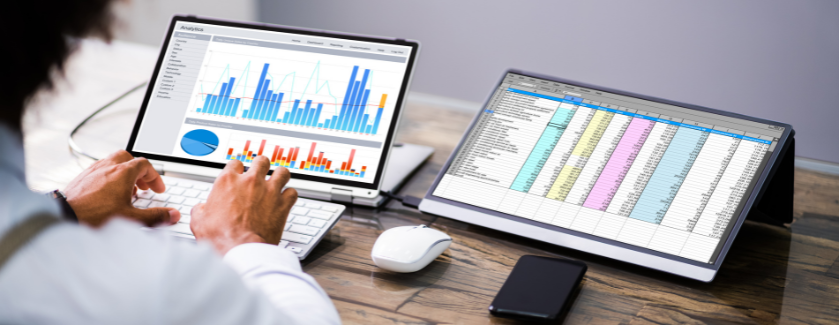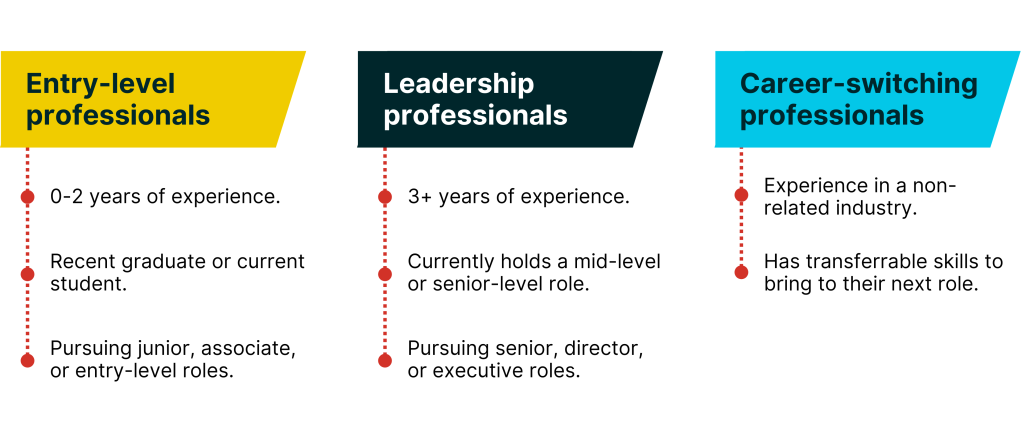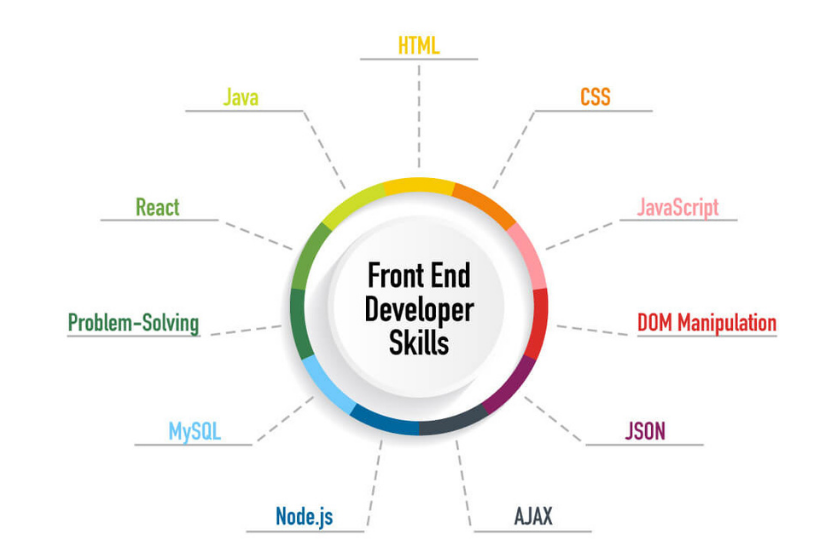
Competitive candidates understand how to speak confidently about their technical and transferable skills in ways that sell their professional value to employers. Not there yet? Let us help.
This guide provides a list of sample interview questions and tips on how to build your responses to common interview questions in the data industry.
Interview questions by category
We have categorized the interview questions into three sections. Feel free to read straight-through, or jump to the section that interests you most.
Tell me about yourself.
Give a snapshot of your work history. Think about your past (previous experience and education), present (your current job and how it’s preparing you for this role), and future (why you want the job you’re interviewing for). Your snapshot should show the interviewer how your experiences equipped you with the skills to succeed at their company, and why you are interested in the specific role.
What are your greatest strengths and weaknesses as a data professional?
Consider the job description and the required skills in the posting, and align your answer with a skill you’ve mastered. Discuss your areas of expertise and how they will benefit the organization, team, or position. For weaknesses, discuss a skill that you are actively working to improve. Explain the steps that you have already taken to improve this skill, and the success that you have already achieved.
Why do you want this job?
Demonstrate that you’ve researched the company, and express what you like about it and why your skills would be a good fit for the job. Explain how the role will contribute to your career progression and what you can contribute to the team. Be specific and express enthusiasm about potentially working for the company.
Where do you see yourself in five years?
This question is designed to probe your career goals and vision. Tell your interviewer about your career aspirations and ambitions. Express your desire to succeed and explain how this job will contribute to your progress. This is an opportunity to show that you are goal-oriented and that you have a plan to achieve those goals.
What are your salary expectations?
Prepare thoroughly for this question. Research salary ranges for this particular job, this industry, and your geographic area. Use websites like Payscale.com or Salary.com. The interviewer wants to know how you value yourself. It is recommended that you avoid speaking about salary until an offer is made. If you must speak about salary expectations, ask the interviewer how they value the role before stating your expectations. Use the salary given by the interviewer as leverage to negotiate a favorable salary. Aim high, but within the range you’ve researched, and be prepared to provide examples of why you’re worth the salary that you cite.
Helpful resources:
Salary negotiation is a hot topic these days. Check out our Salary negotiation guide and salary negotiation article, Know your worth: Tips for salary negotiation, to learn more about earning what you are worth.
What are the basic steps for any data analysis project?
List and describe the steps involved in data analysis. Then use the STAR Method to provide an example of how you have used this process to achieve success. Note that steps may differ among professionals in the data industry, so be ready to explain why you follow the process that you are presenting.
How can you handle missing values in a dataset?
This question calls out a common issue in the data industry, missing values in a dataset. Employers want to know how you will handle this situation when it occurs. Name and describe some of the strategies that one can use when there are missing values. Consider using the STAR Method to describe a time when you successfully used one of these strategies.
Name a few statistical methods that are valuable for data analysis.
Employers ask this question in order to understand your ability to use statistical methods in data analysis. List and describe a few statistical methods that are relevant to the role that you are interviewing for. Consider using the STAR Method to describe a time when you successfully used one of these statistical methods.
What is your experience with SQL?
This question can be tricky if you are a career starter or career switcher. You may feel a desire to downplay your skills; however, interviews are not the time to be humble. When answering this question give an honest answer about your skills and your ability to learn new skills without overstating your qualifications.
Write an algorithm that does _______.
Questions that require you to write code often take place during whiteboard interviews or online technical assessments. We recommend that you take the following steps to answer these types of questions.
- Repeat the question, and ask clarifying questions.
- Write the pseudocode for your algorithm.
- Write the code.
Pro tip:
You will find that some employers include technical screenings as a part of the hiring process. Technical screenings are an opportunity for you to demonstrate your technical skills in the form of an assessment, live interview, or take-home project. Learn more about technical screenings in our Technical screening guide.
Employers may ask you questions that are specific to your level of experience in the industry. The following sample interview questions are specific to entry-level professionals, leadership professionals, and professionals that are switching careers.

Interview questions for entry-level professionals
Tell me about a time that you got unexpected results.
As you know, a good data analyst lets the data drive the analysis, rather than expectations. Your response to this question should show that you are a data-driven analyst. This question is an opportunity for you to show that you validate your results, know how to overcome biases, or recognize new opportunities in surprising results. Use the STAR Method to craft a concise, yet thorough description of a time that you got an unexpected result, and explain the actions that you took in response to the data. (You can learn about the STAR Method in our Behavioral interview prep guide.)
How do you stay abreast of industry trends?
This is an excellent opportunity to show that you are passionate about web development and willing to put forth the extra effort to stay current on the latest news and trends in the industry. Cite three to four ways you track the industry and how each process or tool benefits you.
What is the largest data set that you have worked with?
Employers ask this question in order to understand if the candidate can work with large data sets. Use the STAR Method to tell a story about a time that you worked with a large data set. Your story should focus on the size and type of data that you worked with, and your strategy for dealing with the data.
Interview questions for leadership professionals
Why do you want to be a leader in our company?
Your response gives the interviewer a sense of how you’ve conceptualized this leadership role and if you’re ready for the responsibilities. They may also want to assess how well your professional values align with the company values. Discuss what you enjoy about being a leader and/or experiences that have prepared you for leadership.
How would you go about measuring the performance of our company?
This question seeks to understand two things: How do you approach data analysis? and Have you researched the company? Your response to this question should show that you know how to develop and manage a data analysis project, and that you understand the needs of the company. Consider including a story about a relevant project that you have completed.
Expert advice
“It’s important for the employer to have an understanding of how you approach your work – how you work with others, how you approach and manage projects and how you solve problems. If you don’t give them tangible examples and/or evidence of doing this in a positive and helpful way, they don’t know enough about you to make an informed decision.”
– Deanna P., career expert at edX

How do you explain your results and processes to non-technical audiences?
Questions asking candidates to describe a technical topic to a non-technical person are designed to test communication skills. Your answer should show that you are able to effectively discuss your technical projects with a wide range of stakeholders. Consider using the STAR Method to discuss a time that you collaborated with non-technical stakeholders.
Interview questions for career-switching professionals
Why are you leaving your current job or changing career paths?
This can be a tricky question; always remain positive. When discussing your current company or environment, give a truthful reason as to why you’re leaving, but don’t bring negativity into the discussion. Focus your answer on developing and expanding your career into the data industry. Share what you’ve learned about this potential new employer and how it’s a good fit for your goals, strengths, and experience.
In your opinion, what makes a data analyst great?
We recommend considering both technical skills and soft skills. Your response should elaborate on how a great data analyst brings more to a team than simply manipulating numbers. Consider providing an example of how you have demonstrated the skills that you mention.
What is your process for cleaning data?
Employers want to ensure that candidates highly value data cleaning as a part of the data analysis process. A strong answer to this question includes the data cleaning process that the candidate follows, as well as reasoning for why they utilize this process. Use the STAR Method to concisely share a time that you used your process to clean data.









